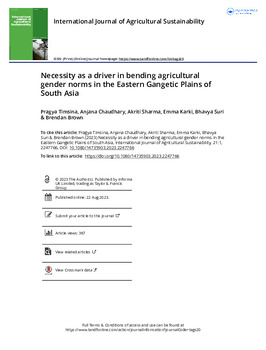Necessity as a driver in bending agricultural gender norms in the Eastern Gangetic Plains of South Asia
Abstract
The majority of the farmers in the rural Global South continue to depend directly or indirectly on agriculture for their livelihoods. Despite the fact that women account for almost half of the world's farmers, they face gender-specific challenges such as deeply rooted cultural and social norms that limit their access to land, assets, financial markets, agricultural training, and information. Using semi-structured interviews with farmers in the Eastern Gangetic Plains, this study investigates how necessity is becoming one of the major drivers in the bending of agricultural gender norms. The study investigates the connections between feminist political ecology and agricultural technology production frameworks in order to comprehend the implications of technology adoption and influences on gender norms in communities. Women's participation in agriculture was found to be heavily influenced by social and cultural barriers, and they were frequently subjected to social criticism for breaking the systemic gender norms. This paper emphasizes on the growing pattern of bending gender norms with recommendations for increasing women's participation and scope in future agriculture development initiatives through policies and interventions that emphasize gender equity.

